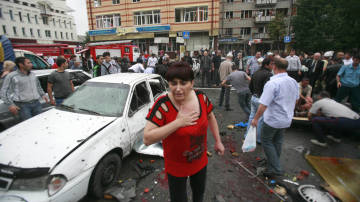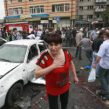
Ingush Rebels Tied to Major Suicide Attack in Vladikavkaz
Publication: Eurasia Daily Monitor Volume: 7 Issue: 162

The death toll from the September 9 suicide bombing in Vladikavkaz, North Ossetia, rose today (September 10) to 18 (a toll that includes, according to some reports, one suicide bomber) with the number of wounded put at 158, more than 100 of whom remain hospitalized. An 18-month-old infant was among those killed. The source of the blast was a car parked near the entrance to one of the main markets in the city. The bomb, which consisted of explosives and a gas canister, was packed with metal shards to serve as shrapnel, exploded with the force of 30-40 kilograms of TNT (www.kavkaz-uzel.ru, September 9).
There have been contradictory reports as to whether the blast was detonated by a suicide bomber or by remote control: North Ossetia’s President, Taimuraz Mamsurov, said the blast was triggered by a suicide bomber driving a Volga-3102 automobile that had arrived in Vladikavkaz with Ingush license plates (Interfax, September 10). At least one source partially identified the alleged suicide bomber: RIA Novosti quoted an anonymous North Ossetian law enforcement official as saying that the car was driven by someone with the surname Archiev. The source said that the car belonged to someone with the surname Dobriev, and that the vehicle had crossed the administrative border between Ingushetia and North Ossetia 20 minutes before the blast (RIA Novosti, September 9).
Kommersant reported today that authorities suspect that the bombing was carried out by members of the Ekhazhevo Jamaat, named after the village in Ingushetia where the group is based and, according to the newspaper, one of the largest armed underground groups in the North Caucasus. Kommersant said the bombing may have been in revenge for a special operation carried out in Ekazhevo in March of this year, during which seven militants were killed, including the rebel ideologist Aleksandr Tikhomirov, aka Said Buryatsky. Federal Security Service (FSB) Director Aleksandr Bortnikov, who traveled to Vladikavkaz following the market bombing, said that three suspects had already been taken into custody. According to Kommersant, Doku Umarov, the Chechen rebel leader and “emir” of the Caucasus Emirate, in essence took credit for the Vladikavkaz bombing by posting a video on the Kavkaz Center website on September 9 in which he promised to continue to carry out “special operations” in Russia (Kommersant, September 10; www.kavkazcenter.com, September 9).
Meanwhile, Ingushetia’s Interior Minister, Viktor Pogolov told Interfax today (September 10) that it would be “premature” to say that residents of Ingushetia carried out the Vladikavkaz bombing. He confirmed that the car used in the blast belonged to a resident of Ingushetia named Dobriev, but said Dobriev had already told investigators that he had sold the car shortly before the terrorist act. Pogolov said it was likely Dobriev had no role in the attack. Pogolov also denied the existence of the Ekazhevo Jamaat (https://www.interfax.ru/society/txt.asp?id=154009).
The Vladikavkaz bombing came on the heels of a suicide bombing on September 5 targeting a military camp in Dagestan that killed four people and injured more than 30 others. The suicide bomber drove his car into the camp of the 136th Motorized Rifle Brigade located near the city of Buinaksk, killing three servicemen immediately. A fourth serviceman died later in the hospital (The Moscow Times, September 7). The suicide bomber tried to drive his Lada containing about 50 kilograms of explosives onto a firing range, but soldiers reportedly blocked his path with a military truck, preventing the bomber from reaching tents where hundreds of soldiers were sleeping (Reuters, September 5).
On September 9, a powerful improvised explosive device (IED) was discovered and defused at the Irganaisky hydroelectric power plant in Dagestan’s Untsukulsky district, where a fire was reported on September 7. While officials said the fire was caused by an accident, the rebel Kavkaz Center website reported on September 8 that three bombs had been placed at the power plant, two of which went off (www.kavkaz-uzel.ru, September 9; www.kavkazcenter.com, September 8).
Also on September 9, two people were killed in a hotel in Dagestan’s capital Makhachkala when a bomb went off in one of the hotel’s rooms, after which three masked men ran out of the room and shot to death a hotel administrator and a hotel guest before escaping. Explosive devices and components were later found in the room along with several hand grenades. That same day, a police captain shot outside his home in the Dagestani city of Khasavyurt on September 8 died of his wounds (www.kavkaz-uzel.ru, September 9; The Moscow Times, September 10).
Also on September 8, unidentified attackers fired a grenade launcher at the premises of a detachment of FSB border guards in the center of Nazran, Ingushetia’s main city. A law enforcement source told Interfax that the attack took place around 2:30 a.m., local time, and lasted several minutes. No one was hurt in the incident (www.newsru.com, RIA Novosti, September 8).
Late on September 7, unidentified gunmen shot to death a federal judge, Dzhulber Bykov, in the village of Baksanenok in Kabardino-Balkaria’s Baksan district. A law enforcement source told Interfax that Bykov was shot in a car outside his home and later died of his wounds (www.newsru.com, September 8).




